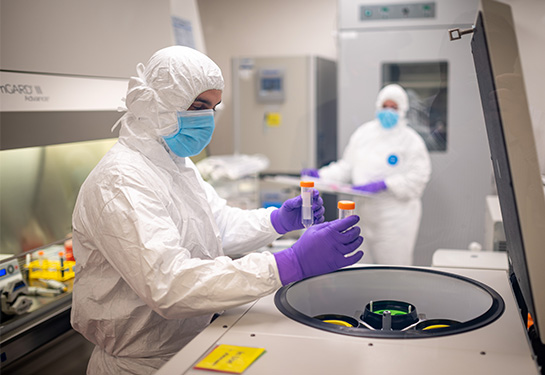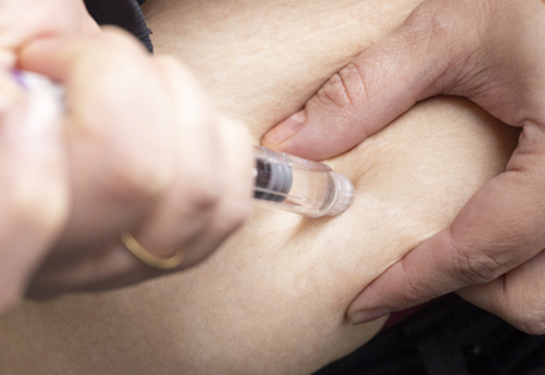UC Davis Health leads study on promising stem cell-based therapy for Crohn’s disease
A stem cell therapy for Crohn's disease developed by UC Davis Health researchers has shown promising results in mouse studies.
The research, published in npj Regenerative Medicine, showed that human bone marrow-derived mesenchymal stem cells (hMSCs) helped heal the lining of the intestines and prompted a positive immunologic response. These effects were noted early after the administration of the stem cells and were sustained when no live hMSCs were present.
Crohn’s disease is an inflammatory bowel disease that causes chronic inflammation of the gastrointestinal tract. It is thought to result from an inappropriate response of the body’s immune system to intestinal microbes and environmental factors. The disease, which affects more than one million people in the United States, can lead to severe disabling complications like fistulas, strictures and abscesses that may require hospitalization and surgery.
“Crohn’s disease can severely affect the quality of life of patients. Existing treatments for this disease use immunosuppressive medications to offer relief from common symptoms and allow the intestinal tissues to heal,” said Maneesh Dave, associate professor of gastroenterology and principal investigator of the study.
“However, only a fraction of patients achieve and remain in remission for a long duration. Additionally, the use of these medications is associated with undesired outcomes, such as severe infections and malignancies. Thus, there is a need for novel therapies that induce sustained remission with minimal side effects to treat Crohn’s disease,” he added.
Only a fraction of patients achieves and remains in remission for a long duration. Therefore, there is a need for novel therapies that induce sustained remission with minimal side effects to treat Crohn’s disease.”—Maneesh Dave
The study
To study the therapeutic effects and mechanism of action of mesenchymal stem cells (MSC), the researchers used a mouse model known as SAMP-1/YitFc (SAMP). SAMP represents a model of Crohn’s disease-like ileitis (small intestine inflammation) and is ideal for studying chronic intestinal inflammation.
The researchers found that hMSCs given to mice with chronic intestinal inflammation promoted the restoration of the inner lining of the intestine (mucosal healing) and immunologic response. These effects were noticed while the hMSCs were still present nine days after cell administration and by day 28, after hMSCs were no longer present.
“The sustained healing power of hMSCs after the cells are gone was a pleasant surprise,” Dave commented. “The question was: How do these cells work to heal the mucosal lining?”
The team discovered that the sustained healing of the tissues by MSCs occurred in two stages. In the early stage, MSCs release prostaglandin E2 (PGE2) molecules that suppress the immune T-cells (a known cause of inflammation) and convert macrophages (a special type of white cells) into an anti-inflammatory mode.
Later, these macrophages consume the dying MSCs by a process known as efferocytosis, leading to their transformation into anti-inflammatory cells which sustains the immune response.
“Our findings show that MSCs result in healing and tissue regeneration in a chronic model of small intestinal inflammation, and despite being short-lived, they exert long-term effects via sustained anti-inflammatory programming of macrophages,” Dave explained.
Moving forward, Dave and his team are leading a clinical trial using mesenchymal stem cells to treat patients with perianal fistulas associated with Crohn's disease.
Additional co-authors include Arnold Caplan, Prathyush Chirra, Fabio Cominelli, Atul Dev, Lam Khuat, Ganapati Mahabeleshwar, Paola Menghini, Pooja Rani Mina, Verena Carola Obmann, Abdullah Osme, Rodrigo Somoza, Christopher Soto, Satish Viswanath, Nan Zhao, Blythe Durbin-Johnson, principal statistician in public health sciences; William Murphy, distinguished professor of dermatology; and Jan Nolta, director of the stem cell program at the UC Davis School of Medicine.
This research was supported by the Crohn’s and Colitis Foundation CDA award (370615) and National Institutes of Health grant (K08DK110421).





